I never really hopped onto the Assassin's Creed bandwagon when the first one was released in 2007. The historical setting and gameplay concepts were intriguing and I wanted to play it, but I wasn't sure if I would like it enough to warrant an outright purchase. And since Ubisoft never bothered to release a playable demo on the PlayStation Network, I never played the game.
So I missed the first two games and their various spin-offs. But when I started seeing information about the third game, and its setting during the American Revolution, my curiosity piqued. The trailers made it look as though parts of the game were played during large-scale battles, and I thought that would be really cool to play. So when I found that a friend (Huh?Mr.Box!) was willing to let me borrow his copy, I decided to give it a chance.
And boy was I disappointed!
A button that does everything does nothing
My core complaint with Assassin's Creed (and many other games like it) is that I don't like how dumbed down the controls are, and how little actual control the user has. The run button is also the "climb" button and sometimes the "jump" button (even though there is a dedicated "jump" button). I've always held that when a single button does everything, then it really does nothing. Assassin's Creed regularly feels like I am not playing the game; a procedural function created by the developers is playing the game.
Instead of the game just doing what the player tells it to do, it has to determine which of several pre-determined context-sensitive actions the developers decided to pre-program. You might want to try to sprint through a narrow alleyway between two close buildings to chase a courrier, but if you're just a few pixels off, you end up jumping up the side of the wall and climbing to the top of the building. And then it's a pain in the ass to get back down, and the courrier is now two blocks away.
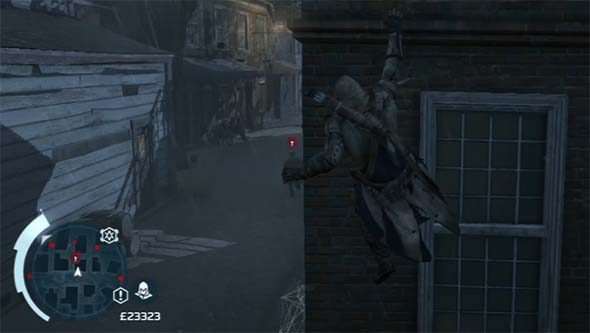
Because I wasn't lined up perfectly, the free run forces me to climb up this building,
when all I really wanted to do was chase the courier through this alley way.
Maybe I want to jump off of a building onto a nearby tree branch in order to stay above a group of enemy Redcoats that I'm trying to stealth past. But for some reason, the game decides to make my character leap past the tree branch and right into the middle of the group of bad guys. Now my cover is blown, I'm stuck in combat, and maybe I've even failed a bonus objective or two.
These sorts of problems could be avoided if the "climb" and "jump" commands were their own buttons separate from the "run" button. Then my character wouldn't accidentally climb a building instead of run by it (or vice versa). And (assuming the jump button can differentiate between a long jump and short jump) I'd have better control of when and how far the character jumps.
I don't mind simplification when it makes sense. If you're game is so complex that the controller is just jammed-full of useful functions that you have to group them together, that's one thing. But Assassin's Creed already has a dedicated jump button! So overriding the Free Run to include jumping is just redundant. And it should have been fairly simple to allocate the circle or triangle button to enter "climb mode". Heck, I would even have been happy if "jump" and "climb" were both overridden to the same button because they are both commands for vertical movement. But don't map them to the basic "run" function!
If the character is going to fuck up and jump the wrong way or do something that I don't want him to do, I want it to feel like it's because I screwed up; not because the game made him do the wrong thing.
A game that has a similar structure and mechanics is The Saboteur. While that game's controls have their own comfort issues, it at least gives the player more control with a dedicated jump button that is used to climb. So when you screw up, you feel more like it is your fault rather than the game screwing you up. I'm also a little bit more willing to overlook some of The Saboteur's control discomforts because that game combines multiple gameplay mechanics, and so the climbing and parkour is just one form of locomotion that the entire game is not dependent on. In Assassin's Creed, that's the whole game, and Ubisoft has had at least four previous Assassin's Creed games to learn from.
There's also a weird issue in which the camera locks itself in position after finishing combat. This makes it difficult to find corpses to loot, spot other incoming threats, or find an escape route if you need to get away quickly. It can also interfere with finding objectives or collectibles in the area. It's a very weird and annoying mechanical issue, and I'm not sure if it's a glitch or a "feature".
Low difficulty compensates for unreliable controls
And because the controls are fundamentally unreliable, the game has to be excessively forgiving and easy to the point that there is virtually no challenge. Most of my "Game Overs" resulted from arbitrary "desynching" because I went somewhere I wasn't supposed to go or did something I wasn't supposed to do. If you're a completionist, then some bonus objectives can often be hard to accomplish, but that's mostly just because you have to fight with the controls in order to not fail them.
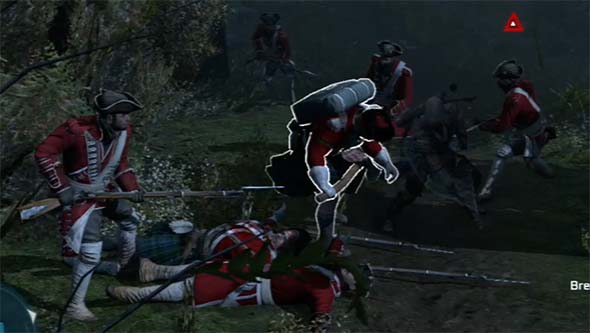
The sheer majority of combat is overly easy and requires little effort or skill from the player.
Combat is almost trivial. There's no reason or incentive to use any of the fancy tools that you have because the tactic of waiting to parry and then insta-killing every enemy is so effective. The enemies are even kind enough to telegraph their attacks and put a red icon over their heads in case it's too much to ask for you to actually watch their behavior. In fact, pretty much the only time I ever take damage in combat is when someone shoots me with a musket from off-screen, or if I get sloppy and mash the attack button too much.
The side quest feedback loop
It becomes pretty apparent early in the game that side quests are pointless. There isn't much to spend your money on that actually contributes to core gameplay or the main questline, so all those loot crates, hunting, and trading starts to feel pretty worthless pretty quickly. Weapons are cheap, and only a one-time cost, and some of them can be acquired for free from enemies. So the only ongoing cost is ammunition, which you rarely need because of the insta-kill parrying.
The remaining uses for money are to buy things that only contribute further to the side quests. And side quests only earn you more money. So all you're doing is earning money for the sake of earning money, with nothing worthwhile to spend it on.
And there's so many side quests in the game! The homestead missions, liberation missions, forts, scavenging for collectibles, hunting animals, crafting, setting up trade routes, the Assassin's Guild missions, board games, sailing, heck there's even a Boston fight club! Oh, and I guess there's a couple of assassination side missions too. Most of these tasks are very simple, but require tedious trekking around the various maps, which makes them rarely worth the time investment.
The only side content that is remotely interesting is the sailing, but there's only three campaign missions that require it (including the sailing tutorial mission). The sailing missions in the campaign aren't even that hard, so it's not even worth investing in the upgrades for the ship. Sailing could very well be the single, most enjoyable experience that the game has to offer, but there's just no reason to ever do it. An entire game could probably be dedicated around this sailing feature, and has the potential to be really fun! But in Assassin's Creed III, it's just one massive waste of time in a long series of wastes of time that the game is diluted with.
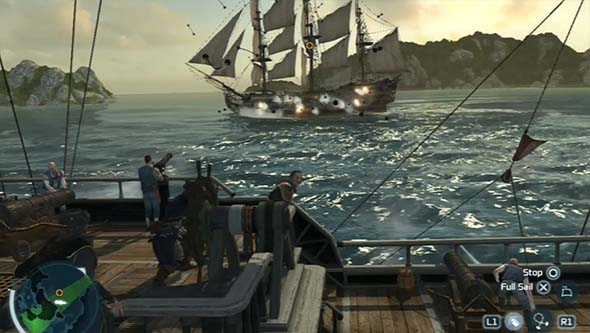
Sailing is a fun and surprisingly detailed distraction, but it's a completely superfluous new feature.
Even the main campaign seems very unfocused. Early missions with Haytham feel like a series of tutorials, mostly for different games. And you're often required to do a tutorial for something that you'll do exactly once and then never again - or if it ever does come up again, it must have been in side content that I never found. You don't get around to doing an actual assassination until the end of the [2nd or 3rd] sequence, and that's only after a drawn-out horse chase that made up the rest of the mission. All the rest of the game (including many of the story missions) feel more like side content than a singular game.

And there's some entire sequences that are almost unbearable to play and witness. The prison sequence is particularly bad - especially the part where the bad guys catch you in a trap, but instead of killing you on the spot with a bullet to the back of the head, they give a cliched Bond-villain monologue and then organize an elaborate public execution for you. What could go wrong?! Then he does it again later in the story!
And while we're on the topic of stupid, why do the fort side missions require that you blow up the ammo reserves if you're just going to capture the fort for the patriots anyway? Shouldn't you leave the ammo reserves so that the new, colonial overseers could use it?
Connor participates in several well-known Revolutionary battles, including Concord [LEFT] and Bunker Hill [RIGHT].
There's a few set-piece missions that take place during Revolutionary battles. The game really comes to life during these brief segments, especially when the battle is a framing device for an assassination attempt. There's some very nice visual and sound design for the backdrops of some of these battles that really does make you feel like you're part of a larger scale event. Sneaking past the lines of British regulars that are in pitched battle with the colonial militia is exciting, but it's too bad that the game doesn't use the chaos of battle to make reaching your target a bit more dynamic. Most of these come down to following a clearly-signposted, linear path to the target and pressing a single button to complete the mission.
The Chesapeake Bay naval mission at the end of the game is probably the highlight of the entire game for me. It looks incredible, and the battle itself (though limited in scale) is an epic and tense cat-and-mouse affair. In fact, I was glad that I hadn't bothered to invest money into upgrading my ship. If I had upgraded, the enemy ships probably would have been nonthreatening push-overs, and the whole mission would have dragged.
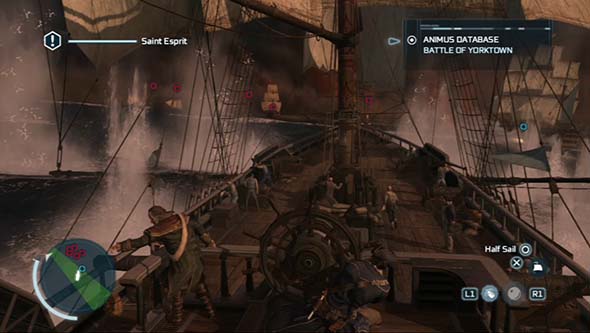
The tense and challenging Chesapeake Bay mission was the highlight of the entire game for me.
These exciting battles are the exception to the rule, and a lot of campaign missions require the player to simply walk from one place to another or perform some mundane fetch quest. Some missions involve Connor inexplicably attending historic events. I'm really not sure why Connor needed to be at the Continental Congress that elected Washington as general, or why he needed to be at the signing of the Declaration of Independence. He has no reason to be in Philadelphia during these events. He doesn't do anything to contribute, and the mission usually just consists of him getting into an argument with someone and then walking out of the room to be teleported back to Boston or the homestead and carry on with the game. So these events feel like strange cases of historical fan service, rather than being even remotely integral to the plot of the game.
After the glorious Chesapeake Bay mission, the game completely falls apart in its last leg. The final mission is long, boring, and stupid. The final confrontations with Lee drag on forever and are wholly anti-climactic.
In the end, very little (if any) of the side content actually contributes to Connor's assassination missions or his desire for revenge against Lee and Haytham. Again, let's make a comparison to The Saboteur. That game is littered with optional side content, but it's actually worth doing in at least some cases because it can actually affect the outcome of missions. It also certainly helps that all of The Saboteur's side content is actual gameplay that you play. Half of Assassin's Creed III's side content basically comes down to manipulating spreadsheets.
Sailing [LEFT] and navigating underground mazes [RIGHT] come up once or twice in the story,
but other side quests are tutorialized in story missions and then never seen again.
Further still, even if the specific optional content that you decide to do in The Saboteur doesn't impact story missions, there is at least the sense that the sabotage content is contributing to the main character's cause, since it helps to liberate the city of Paris from Nazi control. Liberating Paris' districts in The Saboteur also affects the game world. Liberating Boston or New York in Assassin's Creed III doesn't seem to have any effect. It just replaces the British Redcoat patrols with colonial militia patrols that behave identically and treat you exactly the same (as far as I can tell). In a game called "The Sabotuer", you spend most of it performing acts of sabotage. Very apt. In a game called "Assassin's Creed", you spend virtually none of it actually doing assassinations.
Themes are lost in the inconsequential side content
I think the point of the homesteading and trading mechanics is to convey a sense of rugged frontiersmanship and free entrepreneurialship, both of which are quintessential American ideals. Unfortunately, since the side content is so inconsequential, these themes get lost in the actual narrative and don't really go anywhere. If these themes had been a stronger focus of the narrative, and if the player had to directly deal with the taxation and regulation of the British leading up to the revolution, then it would have been an excellent use of the historical setting to inform gameplay and the deeper narrative. But the designers just completely missed the mark in this regard.
There are other themes and motifs that run through the game as well. Some are better developed than others. The themes of family abandonment, betrayal, and revenge are pretty strong and permeate the main narratives of both Connor and Desmond. They are also tangentially related to the American Revolution, since both the colonists and the royalists felt an element of familiar betrayal in each other's actions. The game also hits on issues of slavery, states' rights, and anti-authoritarianism. All of these are also significant themes of American history, but they are only glanced upon by the game and never expounded upon in any meaningful way. Perhaps the American Civil War would have been a better setting?
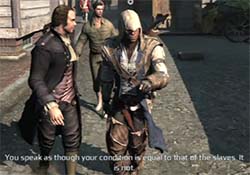
The brief bits of social commentary in the memory sequences is valuable, but all the modern social justice dialogue is ham-fisted
You can also engage in optional story bits by exploring in both the present and the past. A lot of the extra dialogue that you can uncover as Desmond is ham-fisted commentary on social justice and the hipocracy of American politics (both past and present). It all seems very insincere, or maybe the writers just aren't articulate or witty enough to come up with something a bit more interesting than Facebook-esque flame rants from a cynical Brit. Seriously, at one point in the game, he sends you an in-game email rant about how the founding fathers were Hippocratic, slave-holding, sexist, homophobic oligarchs.
The closest that the game ever comes to a respectable presentation of these issues is a brief conversation between Connor and Sam Adams about Adams' slaves. And the epilogue sequences at the end of the game do reinforce the fatalist themes from earlier, as Connor witnesses this newly-freed America selling African slaves, and goes home to his native land only to find that his people have been relocated and the land sold to a colonist by the state of New York.
Desmond gets some moments to shine
Speaking of the sections of the game that take place in the modern time, I can appreciate that the developers commit to restraining their interface and button-prompts to the Animus sequences in order to remind the player that they are playing a simulation. The interface is almost completely absent during the chapters in which you play as Desmond. I'm not sure if Desmond ever had anything interesting to do outside the Animus in the first two games, but here he gets a bit of development as he shows off the skills that he's learned from the Animus in a few field missions.
These sequences can be a bit of breath of fresh air and come close to feeling like "boss" challenges, in that you are forced to apply the gameplay skills that you've learned throughout the game without the benefit of your inventory of gadgets, fancy mini-map, and other HUD elements. And the designers even gradually increase the complexity of these chapters. The first one is a simple platforming exercise, and the second one adds some guard patrols and mild combat to the mix. It's a commendable attempt, and I appreciate that the developers feel like they can take the training wheels off, but falls a bit short of being impressive.
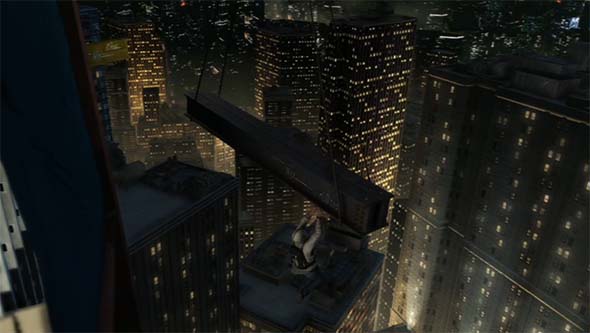
Desmond gets some actual missions and feels relevant to the gameplay.
The problem with this is that the whole game trains you (or at least trained me) to be reliant on these HUD elements, so taking them away only exacerbates the inconsistent control issues that I mentioned at the top of the review. Without the button prompts, it's now impossible to tell if Desmond will perform the desired action. Want to knock out a guard and hide his body in the bushes before the other patrolling guard turns around towards you? You'd better hope that you're standing in exactly the right pixel to pick up the body, because you won't have a button prompt to tell you when that action is available. It's not game-breaking by any stretch, but it does lead to some cheap mission fails. And since the game is trying to be more realistic in these sections, failing and restarting from a checkpoint really breaks the immersion.
Glad I passed this series up
This is just not a very good game. I don't know what happened at Ubisoft that derailed this project so thoroughly, because there are bits of promise in some of the mechanics and themes that could have made for a good game with poignant messages. The various features just don't work together, and it doesn't help that the protagonist is a whiny jerk who doesn't get along with anybody. Perhaps the developers lacked a single creative vision of what the game was supposed to be? Perhaps Ubisoft put pressure on the developers to throw in more side content than was really necessary? Or maybe the lead designers were just incompetent?
I've heard that the first two Assassin's Creed games are the "good ones", and I hope that is true. If III is representative of the series as a whole, then I'm glad I passed this franchise up, and I'm very unlikely to bother trying any of the other games. If a main entry is this rough around the edges, then I can't imagine how dull and repetitive the spin-off games must be.
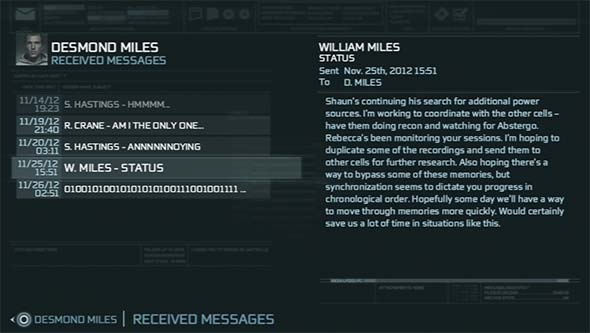
Is this a subtle hint at a future mission select feature that will let us skip the boring parts of the game?